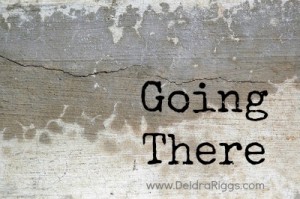The idea for “Going There” came about as a result of the 31 Days In My Brown Skin series I wrote in October, 2012. (You can read those posts here.) The series generated a lot of valuable dialogue, and when the thirty-one days were over, it felt as if the conversation wasn’t done. So, I invite you to share your story as it relates to issues of race, ethnicity, and culture in your every day life.
The goal of “Going There” is to encourage ongoing dialogue about topics of race, ethnicity, and culture in a way that is thoughtful and that shows respect, with the goal of advancing our understanding of the beautiful diversity in the humanity that surrounds us. Interested in sharing your story? Start here. Today’s post is written by my son, Jordan Riggs.
Every time I hear the words “I don’t see color…” I cringe.
Let me explain —
The light-hearted conversation put a sour taste in my mouth when my friend said “…Because you’re a white black man.” It hit me in a flash, this comment is ignorant and in my opinion racist. I voiced my opinion and a discussion was sparked. It started with a few questions revolving around what makes a black man white? Is it how well he articulates his words, his white friends, his taste in clothes, or music? He responded “How is that ignorant?” So I rebutted by explaining that if that was his point then he is saying that “black” black people don’t articulate, have one black friend, and only listen to rap. The response was this “When you word it that way, it’s ignorant [but] you don’t embrace black culture.”
I took a deep breath and responded, “Okay, I’m done. I love you.”
Questions raced through my head but the big one was this: What is black culture to you? Because to me it sounded like I needed to speak ebonics at all times, hang out with only black people, and keep my itunes playlists somewhere between the genres of RnB and Hip-Hop/Rap.
I have been thinking a lot about the way “black people” are viewed in society, so much so that I was prompted to begin a script about the topic. My primary question was this: “Has anything really changed?”
Perhaps with the death of black leaders like Malcolm X and Martin Luther King Jr. the civil rights movement stopped dead and suddenly instead of continuing a discussion our feelings on race drifted into this grey area of “Politically Correct” leaving us with several burning questions, sadness, and perhaps unadulterated anger (amongst other things,) that had to go unaddressed because, well, the conversation just wasn’t allowed.
I see black people on television/youtube and wonder “are people laughing with us or at us?” I watch people like Charles Ramsey, who, with the aid of another man saved three women and a child who had been held hostage in a home for at least a decade and all anyone can talk about is “how funny are the things this black man says, look at his clothes, his hair, his demeanor…” down to the man’s menthol cigarette. In my world (and I am aware that everyone’s environment is different) the conversation had shifted from “this man is a hero,” to “look at this clown.”
On the other side of the coin I feel like racial equality from an African American stand-point has begun to morph into racial superiority in some instances.
At the end of the day I love my friend who thinks I am a white black man, but the statement makes me double-back and wonder how far do we still have to go? Of course we see color and racial differences and so in order to really seek equality across the board its important to recognize that we do identify (within and without) in part, based on the color of our skin. Because of this it is important to remain positive and open when it comes to discussions on race because the one thing between you and knowledge is an unanswered question. So, what are your views on race? What stereotypes do you cling to that prevent you from seeing a person as a person? And what are healthy ways to open these types of discussions as we move forward?
~~~

